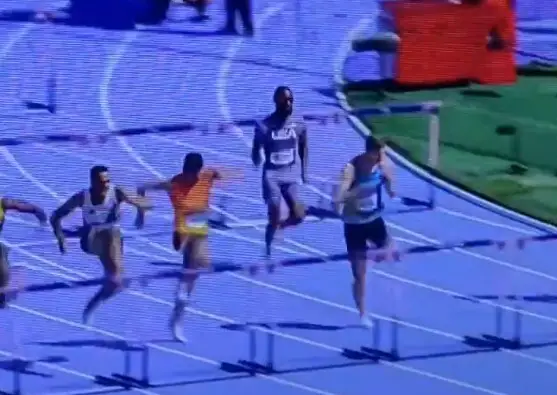Freddie Crittenden, a highly ranked hurdler, shocked fans at the recent Olympics by jogging through his 110m hurdles heat, finishing last. Known for being fourth in the world, Crittenden chose to take it slow due to a slight injury, aiming to save himself for the repechage rounds. In a post-race interview, he explained that an aggravated muscle prompted his cautious approach, hoping for a better performance in subsequent races. Reactions from viewers were mixed, with some applauding his strategic thinking while others were left bewildered. Despite his slow time of 18.27 seconds, Crittenden’s performance still gives him another shot at advancing.
X/NBCOlympics
Crittenden’s decision underscores the strategic considerations athletes must sometimes make in high-stakes competitions. Balancing the risk of injury against the potential for advancing to later rounds is a difficult judgment call. For Crittenden, protecting his physical condition took precedence over immediate performance, demonstrating his long-term focus on the competition.
200 IQ move. Freddie Crittenden jogs through his hurdle heat knowing he will automatically qualify for the repechage round. ? #ParisOlympics
200 IQ move. Freddie Crittenden jogs through his hurdle heat knowing he will automatically qualify for the repechage round. 🧠 #ParisOlympics pic.twitter.com/XavgR7DMev
— NBC Olympics & Paralympics (@NBCOlympics) August 4, 2024
Fans and commentators alike were left to ponder the implications of such a strategy in Olympic sports. While some argued that every race should be given maximum effort, others recognized the wisdom in preserving one’s health for future opportunities. This incident highlights the often unseen calculations that athletes and their coaches must make in the pursuit of excellence.
Ultimately, Crittenden’s choice serves as a reminder of the complexities and pressures of competitive sports at the highest level. His ability to advance despite a seemingly underwhelming performance speaks to the depth of talent and strategy involved in Olympic-level athletics.



